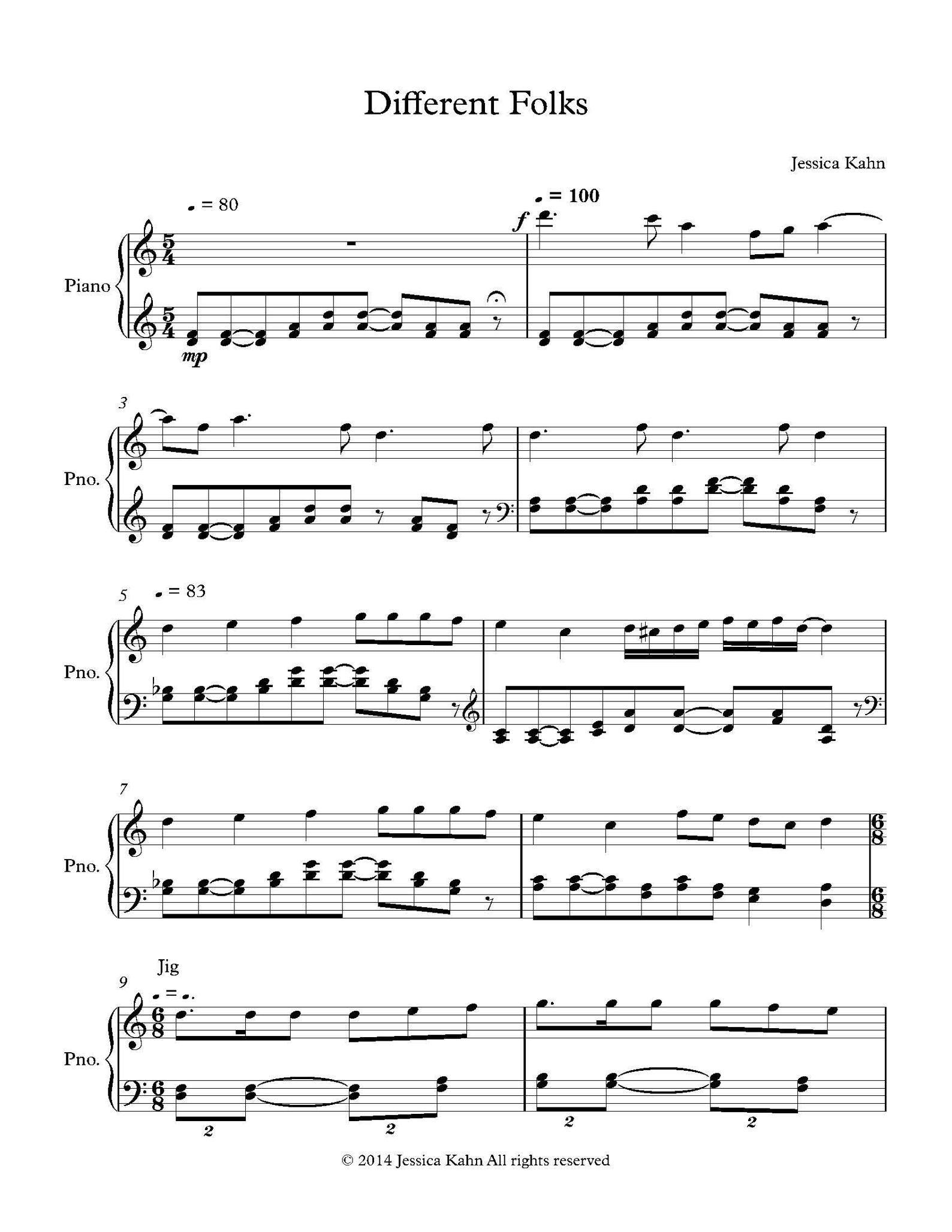On "Different Folks" and Andean musical fusion
Jessica Kahn is a musician and educator of Jewish, Scottish, and Andean descent, and contributor to the Alternative Worlds Andean collection. Here follows an interview wherein we asked her some questions about her composition, "Different Folks," as well as her musical influences.
Different Folks Links
Download Composition (PDF)
Download Audio (MP3)
Can you tell us more about Theodoro Valcárcel and his impact on your work, as well as the Andean musical field?
Actually, when I created Different Folks I wasn’t fully aware of Theodoro Valcárcel, but I was aware of Yma Sumaq who made me see how it was possible to blend classical, opera and Andean folk idioms. She sang Suray Surita also which I have sung with the help of Professor Elvia Andia’s help with the Quechua. Later a collection of Latin American art songs brought attention to the 31 Cantos del Alma Vernacular by Dr Caicedo with her presentation of the Tawa Inkap Takiynin (Four Inca Songs). I now see in Valcárcel’s rendering of both classical training and the indigenous side of his mestizo reality as a foundation for the Andean fusion musical field. Very important to note, he was a pioneer in his work and the first at least fairly well known in this style of writing. His genius, along with Ima Sumaq, inspires me as I seek to make arrangements of Quechua folk songs. He and Ima Sumaq influence a heavyweight in the Andean music field today, Sylvia Falcón. Specifically, he alone influences the conservatories of Puno, Peru that prize such fusions between classical and Andean music folk idioms such as the descending minor thirds found in huaynos. One such composer/arranger besides myself is Jhonathan Jesus Chasquilla.

Page 1 of Jessica Kahn's composition, "Different Folks."
Why did you choose to title your piece “Different Folks?” We love the title and have some ideas, but would love to hear your thoughts.
I chose the Different Folks title to represent different musical folk idioms (Andean, Jewish and Scottish) coexisting together as is evidenced in my experience, yet with an Andean underpinning (guitar and quena theme-guitar/Andean harp theme persists). Different Folks is about different folk idioms surrounding an Andean-spirited folk idiom which starts out the first bar with the guitar/arpa Andina/Andean harp in the thirds and then the quena theme in the next couple of measures with descending minor thirds of a huayno flavor. The Andean harp pervades throughout as accompaniment to other Idioms like the Jewish folk melody middle system flavor of the Jewish dance of the Horah and then lastly the Scottish jig, which ends the piece. Growing up in Ohio I was surrounded by Jewish and Scottish communities in addition to my Andean soul and it has been a journey for sure. My dad is of part indigenous Quechua blood raised in a Jewish household in Peru and my mother has some Scottish. My phenotype and spirit are very much of my Andean Native American Quechua heritage and it does survive in kay pacha (the everyday) through inspiration from Hanan Pacha (my ancestors) and Urin Pacha (spirits of the upper world/higher power).
Can you speak more about why musical fusion is important for Andean folks in the diaspora?
Musical fusion is important for Andean folks in the diaspora because it is a bridge between our worlds and where we are currently. It’s also a way to help us uncover our roots and present them to a larger audience which I believe is a part of our survival. We are still here, let’s be present. In addition it leads to things such as study of native American indigenous languages like Quechua and Aymara, traditional songs like Huaynos and dances like Huaylas all parts of important to initiatives in indigeneity.
Can you tell us more about why you chose to do a rendition of “Suray Surita” and what significance that song has to you?
“Suray, surita” is the ultimate Valcárcel song. Not only is it an art song, but it’s a symphonic work as well. It's sung and performed by anyone important in this type of fusion between classical and Andean who is a soprano and of Andean descent, and that fits me. The song is about the agonies of unreturned love from a fickle lover, which I believe is universal and many have experienced, and the soprano vocal part represents the slighted lover with its beautiful lyric melody all befitting of masterful art song writing on par with greats such as Mozart, Schubert and Mahler.
◇ ◇ ◇
Jessica Kahn will feature more of Valcárcel’s work along with Different Folks on her recital planned February 25 at 6PM EST; you can watch it live on her Facebook Jessica Urpi Kahn and YouTube channel Half Halva.
